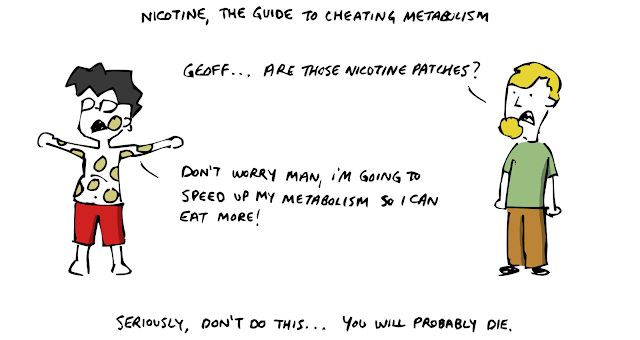Part of getting older is not being able to eat all the crazy
things you did as a kid. While teenagers may be able to eat an entire pizza in
one sitting without showing any adverse effects, it is common knowledge that as
we get older our metabolisms slow down and we put on weight more easily… But
what if that wasn’t actually true?
To understand what I’m talking about you need to understand
what the word metabolism actually means. Your body is a busy place. Even when
you are sitting on the couch or laying in bed catching up on your favourite
illustrated science blog, your body is hard at work doing a million different
things. Blood is pumping though your veins, the muscles in your chest and
diaphragm are flexing to pull air into your lungs, the synapses in your brain
are firing at a rate that is hard you fully comprehend; and all of this
requires energy. Your metabolism is just a measure of how effectively your body
turns the food you eat into the energy you need to function.
A lot of things can impact your basal metabolic rate (the amount
of energy your body uses to do all the basic functioning I just mentioned).
Surprisingly, though, there isn’t as much variability as you might think. Many
people claim to have a slow metabolism, but this is actual a pretty rare
thing and is usually caused by an underlying medical condition like
hypothyroidism or Cushing’s Disease. In truth, the big things that impact your
metabolism are your sex and body composition.
Generally speaking men have less body fat than women and
more of their weight is comprised of muscle mass. Even at rest, muscle burns
more calories than fat so men tend to require more energy just to maintain a
basic level of function. While you may not be able to control your sex, you
have a measure more control over your body composition (within reason). People
who lift weights can increase the proportion of their body weight that is
muscle and thereby burn more calories. That is what is meant by body
composition. Your age can work to slow down your metabolism, but only if you
allow your muscle mass to decrease. Go to any master’s (over 40) track and field
meet and you will find a whole suite of people who maintain speedy metabolisms
simply by continuing to exercise and not letting their muscles deteriorate.
Particularly intense exercise has the added bonus of keeping
your metabolism elevated for a period of time after you are done your workout.
Known as “excess
post-exercise oxygen consumption” (EPOC), the phenomenon is caused by the
recovery processes taking place after a hard day at the gym or the track. A
recent swath of articles in the fitness world with a surprising amount of
science behind them argue that as you increase the
intensity of a workout, you can get the same physical benefits of working
out at an easier level for much much longer. Some have even suggested that if
you run hard enough, 5 minutes a day can give you all the benefits of running
slowly for an hour or more.
But If exercise isn’t your thing and you want to boost your
metabolism anyway, there are options. One of the best is nicotine, which speeds up your heart rate and forces your body to burn more calories. The Mayo clinic
suggests that smoking 20 cigarettes per day is roughly equivalent to putting on
90 lbs in terms of increase to your metabolic rate. (Contrary to popular
thought, fatter people actually have faster
metabolisms than skinnier people with the same activity level because it takes
more energy to move blood around their bodies and they are likely to have
more muscle mass.) Obviously nicotine has its drawbacks if you enjoy being
alive and hope to continue in an animated state for a long period of time, but
if all you’re going for is metabolic speed, it will help.
But even with the help of devastatingly harmful drugs and
all the exercise we can handle, humans are wimps in terms of metabolic
flexibility. Many animals can put us to shame. Bears in particular are masters
of metabolism. Research has suggested that during their winter rest period
(not technically hibernation)
bears can reduce their metabolic rates by 75%. The net effect is reducing their
body temperature by up to 6 degrees! In humans, that is grounds for
hospitalization, but the bears manage it just fine. They don’t fully warm up
again until up to three weeks after leaving their dens.
So in the end, you metabolism may not be an entirely
changeable thing. But next time someone tries you give you spin about your
metabolism slowing down with age, set them straight and tell them to hit the
gym.







3 comments:
I know as long as your organism has physical activity and eat properly your metabolism will work good as long as you live.
zzzzz2018.5.7
tory burch outlet
canada goose jackets
coach factory outlet
nike trainers
chicago bulls jersey
tory burch handbags
valentino
ralph lauren uk
true religion outlet
michael kors uk
bape hoodie
golden goose sneakers
nike air max
supreme clothing
jordan shoes
curry 6
curry 4
balenciaga shoes
retro jordans
retro jordans
Post a Comment